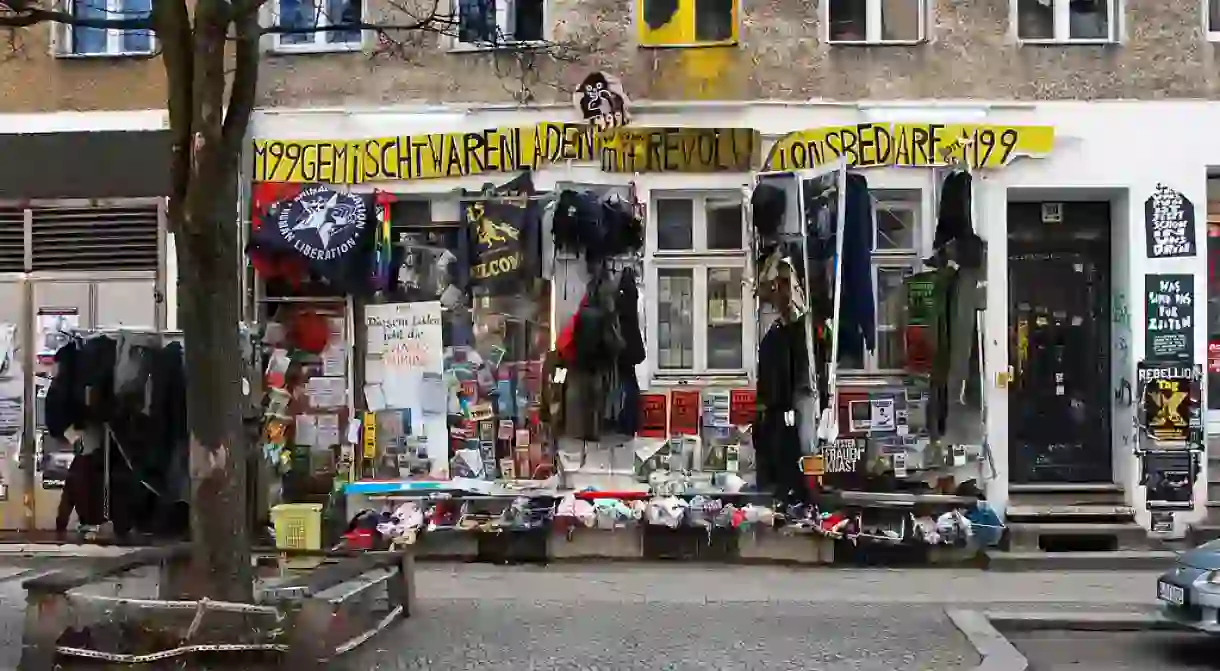Berlin’s ‘State Enemy No. 1’ Loses Against Rampant Gentrification

Not all that surprisingly, Berlin’s rising living costs and the simple passage of time since the days when the city was divided has caused things to change at a rapid pace. It would seem that nearly every week a struggle between the city and the leftists who reside there occurs in Berlin. This time the legendary anarchist shop, M99 – headed by Berlin’s self-proclaimed State Enemy No. 1 – faces eviction.
The store’s legendary owner, Hans-Georg Lindenau, describes M99 as ‘the corner shop for revolutionary needs’, and it is located in Kreuzberg at the intersection between Manteuffelstraße and Waldemarstraße. The interior contains sagging shelves and winding corridors filled to the max with countercultural Losing Against clothing, literature, and other devices associated with opposition to the state. There is even pepper spray for sale marketed as ‘antifascist deodorant’.
This place has been open for decades, despite 30 year’s worth of attempts by the senate to shut it down. One means by which the state has attempted to close the shop is by sending police to raid it for illegal materials. In the 54 forced searches of the shop, they never found a single piece of illegal contraband.
Meanwhile, the famed, wheelchair-bound Lidenau has shouldered resistance from the government and supplied Berlin’s revolutionaries, antifascists, and anarchists the whole way through. What’s more is that M99 also serves as his home, meaning that its fate is of even greater significance to him.
Despite his efforts to defend the shop against the senate, the final nail in the coffin appears to be coming in the form of gentrification. Once the cheapest neighborhood in the city and a haven for squatters, Kreuzberg is now reported to have some of the highest rents in Berlin. A new real estate developer, Frederick Hellmann, bought the building where the shop is located and canceled Lidenau’s contract after accusations he illegally sublet the apartment located above the shop, a claim that Lidenau refutes as a lie. He also explains that the arbitrary conditions of illegality vs. legality have changed to his detriment over time.
Of course, there is always more nuance to the story. Hellmann, for instance, is not the typical predatory villain that we often imagine real estate developers to be. Though American-born, he too has lived in Berlin since the 80s. His lawyer claims that Hellmann acquired the building as an investment for his retirement.
Since the onset of the Cold War, Berlin has been the home of many different countercultural movements. Compounds of squatters and anarchists have played an integral part in shaping neighborhoods like Kreuzberg for many decades. Whether or not Hellmann’s intents are malicious, the story of Lidenau and M99 offers a reflection on the ways that gentrification is changing the faces of cities across the globe by creating economic hierarchies of power in the currency of people’s precious living spaces. Unfortunately, this means the loss of a way of life for many, and with it, the erasure of the foothold these countercultural lifestyles had in a major world capital.
Lidenau was ordered to move out of the apartment on August 9th, but several demonstrations with hundreds in attendance were held on his behalf. The ruling has subsequently been delayed until after local elections are held in September.














